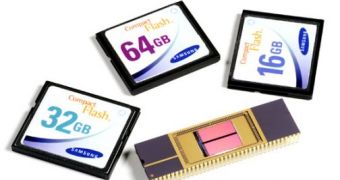JEDEC Solid State Technology Association recently announced the organization is quickly moving towards the publication of the next-generation flash memory standard called UFS, that promises to offer mobile devices data throughput rates of up to 300MB/s in its first iteration.
Standing for Universal Flash Storage, this standard will use a high speed serial interface and supports native command queuing features to raise the random read/write speeds of flash memory.
According to JEDEC, UFS will also deliver significant reductions in power consumption due to a low active power level and a near to zero idle energy consumption, making it an ideal candidate for digital cameras, mobile phones and other consumer electronic products.
Furthermore, its high throughput rates will enable manufacturers to use such flash memory modules to replace the HDDs or SSDs used in most Windows 7 slates and other bandwidth hungry devices.
Moving further into the future, JEDEC states UFS should be able to deliver up to 2.9Gbps with up-scalability to 5.8Gbps, reaching speeds similar to that of the SATA 6Gps standard that is used in some present day computers.
Speaking from a recent technical committee meeting in San Francisco, Mian Quddus, chairman of JEDEC's JC-64 Committee for Flash Memory Modules, noted, "UFS as an industry-wide flash storage standard will address a number of market demands, including faster data access, lower power consumption, and improved performance for flash-based devices, benefiting device designers and consumers alike.”
For now, the UFS specifications are still under development, JEDEC promising that if all goes well, they will have the standard ready for public use sometime in the next three months, an overview of this technology to be held during CES 2011.
According to JEDEC, right now, the standard is supported by principal consumer electronic and cell phone OEMs, companies such as Micron Technology, Nokia, Phison, Qualcomm, Samsung Electronicsa and Toshiba making the list.

 14 DAY TRIAL //
14 DAY TRIAL //